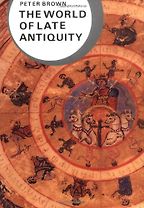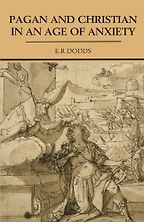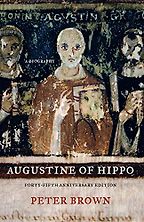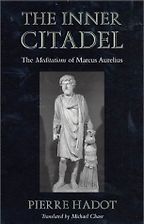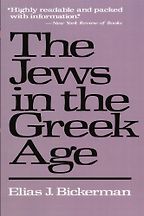Before we start discussing your five books, can you tell me why this particular time in history, from 200 BC to AD 400, interests you?
This is the period when we see the shift from a pre-Christian pagan world to a Christian world out of which the roots of our Christianity arose – first out of the Jewish religion, and then as a force increasingly in its own right. The consequent changes in world view are still essential to our outlook on the world. Whatever personal faith (or lack of it) you may have, only by studying this period can you get behind Christian values or the values of our other major religions, and look at them from a historical point of view and realise that they were historically formed, that they are not the only values and are not obligatory.
Your first choice is The World of Late Antiquity by Peter Brown. What era and area is he describing when he talks about late antiquity?
This remarkable book begins with the Emperor Hadrian in AD 117 and finishes with the emergence of the Prophet Muhammad in Arabia in the 620s. This end point and eastward dimension is thrilling now and was most unusual when Brown first wrote. Many books about the later Roman Empire concentrate on wars and Barbarian attacks in Northern Europe. They lose their reader in their endless campaigns. What I like about this book is that it is focused on cultural, religious and philosophical changes, particularly in the Greek-speaking world, where they were strongest. It extends from Italy to Asia to the Near East brilliantly, including the Persians and turning down to Arabia. Before Brown, nobody who was writing in English had ever linked that area together so powerfully.
This is often described as an overlooked period of history, but Peter Brown sees it as important. Why?
During my lifetime late antiquity has sprung to the centre of what so many undergraduates wish to study and what experts in the ancient world immerse themselves in. The primary reason is this book and Peter Brown’s own extraordinary teaching in a decade based in Oxford between 1965 and 1975. It was one of those explosive moments, and those who remember it will know that they were so lucky to be of that generation and to be touched by it.
Your next book, Pagan and Christian in an Age of Anxiety, by ER Dodds, looks at the common experiences of pagans and Christians at that time.
Peter Brown and ER Dodds were both Irishmen. Dodds was a precursor to Peter Brown and an iconic figure while Brown was writing. There are some subtle differences between the two. Dodds is particularly interested in individual case studies of figures known through literary texts. He was a superb literary scholar but as he had less of a grasp of the social setting I think he found it harder to place them in the shifting tone of their particular generations. And that is where Brown’s great strength lies. He is very good on the relationship between changes in the outer world and those in representations of the inner person.
“Nowadays there is so much emphasis on exercise for the body. Many people go to the gym but pay far too little attention to exercises for the mind.”
But Dodds is brilliant in his last chapter, where he develops the work of a French scholar, Pierre de Labriolle, and surveys how much pagans and Christians shared their views of the world. And this is really path-breaking.
In the book he very much makes the connections between this era in history and his own.
Yes, very much. The title phrase ‘In an Age of Anxiety’ is borrowed from Dodds’s great friend WH Auden, who had written a poem with that name. Dodds was a man of immense literary sensitivity who writes more beautifully in a more lucid prose than any other academic or historian that I have come across. He was also someone who was in touch with the artists of his own generation. And he was interested in applying psychological, and indeed psychotherapeutic, insights into figures known to us from texts in the past. So there is a subtext which is often slightly Freudian in Dodds’s notes, and some of his analysis is very interesting. Interestingly, I think there is a strong similar streak in my third book, another one by Peter Brown.
This is Augustine of Hippo: A Biography. What are the similarities?
Well, Peter Brown’s immense strength is placing the changes in Augustine’s outlook against the changing tone and social pressures of the eras and locations in which he moved. It is a most brilliant picture of the changes in the individual in antiquity who is best known through his own writing, including his superb Confessions. But there is also – although it is never explicit – a psychologically based interpretation of some of Augustine’s changes of direction. You have to look very closely at how deeply this runs through Brown’s book. Like many, I would say that this is the outstanding biography of the 20th century.
Most people will have heard of Augustine, but can you tell us a bit more about him?
Augustine is the giant thinker and writer of the Latin Christian world. He was born in 354 to a simple humble background in a little town called Thagaste in North Africa. He was a man of bewildering literary intelligence and superb literary ability. In conventional caricature, he is feared as a figure of excessive authoritarianism, who held dark views of human nature, who invented the idea of original sin. But when you read his writing, he is a figure of infinite caution on many topics and has a much more subtle mind than people give him credit for. Both philosophically and as a reader of the Bible, he is a challenge to anyone alive now.
What kind of insights did he discover?
Brown’s book is by far the best account of the changes in Augustine’s thinking from his thirties until his old age. Brown sets these thoughts so cleverly against the changes in Augustine’s family’s social context and his own ageing.
Augustine was one of the most important figures in the development of the Western Church. How did Christians slowly begin to win dominance over the pagans?
They won dominance because the state threw its weight behind them. They were massively favoured on and on from Constantine and then continuously from the 390s onwards. There were tax privileges for the clergy and the bishops. Christianity was made the most respectable and prominent religion in the Roman world, so non-Christians were firmly on the back foot.
For many people Christian values offered a strong sense of community. Virtues such as humility and the spiritual merit of the poor were exulted – new virtues in Greco-Roman civilisation. There was the promise of a new life after death, and there was also the promise of the ability of ridding the world of demons, a very powerful motive for joining them.
Your next book, The Inner Citadel by Pierre Hadot, is all about the meditations of the Stoic philosopher-emperor Marcus Aurelius.
Yes. Pierre Hadot was the greatest exponent of classical philosophy in France in my lifetime. He is a towering figure, a brilliant intellectual, though he came from a religious background. What is fascinating here is that he takes on the sort of ‘spiritual diary’ which Marcus Aurelius kept for his own interest. These meditations have often been seen as a rather rambling collection of maxims and thoughts. Brilliantly, they are brought into line by Pierre Hadot, who understands them as spiritual exercises.
Nowadays there is so much emphasis on exercise for the body. Many people go to the gym but pay far too little attention to exercises for the mind. Hadot manages to make sense of the musings of the pagan emperor. They were not written for a public audience, but by understanding them as related to spiritual exercises he has written a revelatory book.
Your final book, The Jews In The Greek Age by Elias J Bickerman, is said to have caused people to rethink Hellenistic Jewish history. Why?
This is a masterly book by one of the supreme scholars. Elias Bickerman was born in St Petersburg and left in the aftermath of the Bolshevik Revolution to go to Germany, where, as a Jew, he eventually came under the threat of persecution. He was obliged to leave for Paris because the Nazis were in power. He ended up destitute on the shores of America. But he had already been trained by some of Europe’s greatest scholars, and he was fluent in the necessary languages. He was taken into a New York seminary and received by his fellow Jews before ending up as a professor at Columbia.
Get the weekly Five Books newsletter
This stunning book of rare clarity was written over a period of 25 years. In the end, he simply tore up the footnotes because they were out of date, and revised the main text just before his death. He is brilliant on the fascinating but less read body of Jewish literature. These books stand in Christian Bibles as the Apocrypha and are still far too little read. Out of them and others he brings this brilliant sketch of the Jewish world down to about 175 BC, in the wake of the shock of Alexander the Great’s conquests and the emergent Greek power all over the Near East. It was an extraordinary episode of history. He stops on the eve of what will be a decisive conflict, the persecution imposed on Jerusalem under the Hellenistic King Antiochus IV.
I think this book is so important because so much of Jewish spirituality and sensitivity that is taken for granted by early Christians actually formed in this period. Bickerman has the commanding grasp of a lifelong expert. He is well aware of all the scholarly disputes about how far Greeks were touched by Jewish culture and how far they weren’t. This is his final reflection on the question and it is quite beautifully written.
What kind of influence did the Greeks have on the Jews?
I will give you one example: texts about the patriarchs on their deathbeds. These ‘Old Testament’ figures speak out and confess that they had been guilty of one overriding sin in their lifetime. One fascinating connection seen by Bickerman is that this sort of confession is a forerunner to St Augustine’s own confessions. With brilliant skill, he shows how the authors of these supposed dying words of the great patriarchs have been touched by a Greek sensitivity. A new emotionalism crept into the stories, none of which has been present in the older scriptures. He draws a brilliant contrast between many Jews’ view of a world created by God and still open to his interference and miracle, and the Greeks’ view of a God who set up the world according to laws like a mechanism and then, on the whole, kept out of it. The entire book is full of food for thought.
Five Books aims to keep its book recommendations and interviews up to date. If you are the interviewee and would like to update your choice of books (or even just what you say about them) please email us at [email protected]
Five Books interviews are expensive to produce. If you've enjoyed this interview, please support us by donating a small amount.
